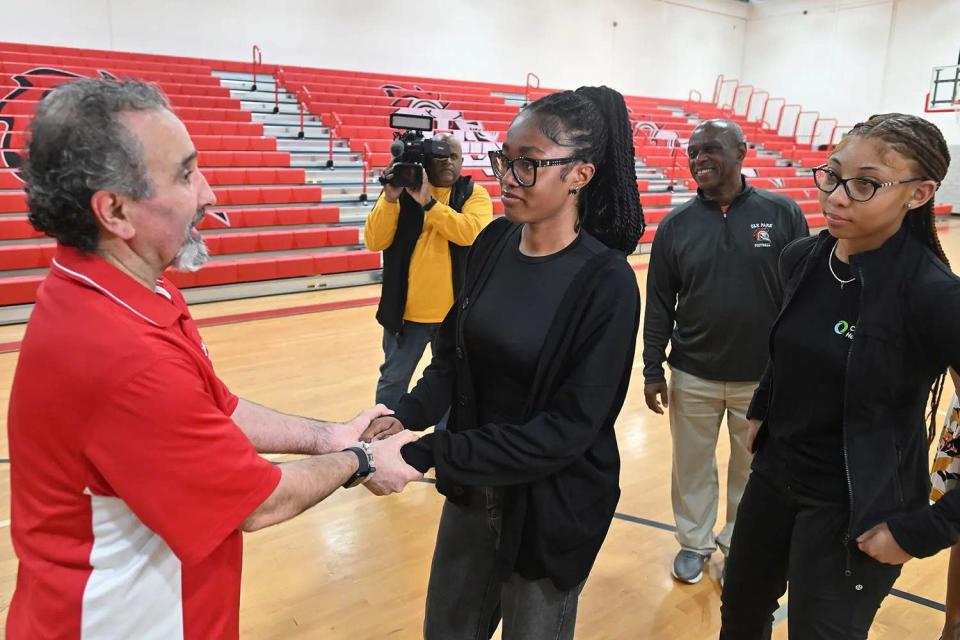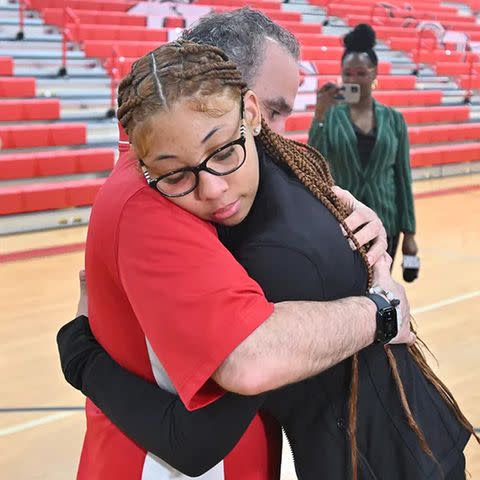2 Students Saved P.E. Teacher's Life After He Suffered Cardiac Arrest: 'Medically, I Was Gone'
"I don't have too much to say other than I love you guys," Alfred Kattola said when reuniting with students Isreal DuBose, 17, and Correy Coleman, 16

Daniel Mears, The Detroit News
Isreal Dubose and Correy Coleman with their teacher Alfred KattolaAlfred Kattola suffered cardiac arrest on March 22 during a student-teacher basketball game
Students Isreal DuBose and Correy Coleman performed CPR and restored his heart with an AED after the P.E. teacher collapsed
Kattola is now praising them for saving his life and hoping to help them pursue medical careers
A Michigan physical education teacher is praising two students for saving his life after he went into cardiac arrest.
On March 22, Alfred Kattola — a coach and P.E. teacher at Oak Park High School in Detroit — started feeling strange during a student-teacher basketball game before collapsing in the gym and suffering cardiac arrest.
"Medically, I was gone," he told Fox News.
Cardiac arrest — also known as sudden cardiac arrest — is the abrupt loss of heart function, resulting from a problem with the heart's electrical system, according to the Mayo Clinic. This disrupts the heart's pumping action and stops blood flow through the body.
After he collapsed, two of Kattola’s students, Isreal DuBose and Correy Coleman, quickly jumped in to help perform CPR.
"We’re sitting in the bleachers…I just knew I had to do something," DuBose, 17, said. "I began compressions and around two and a half rounds of compressions, the [automated external defibrillator] AED was brought and Correy placed the AED pads."
"I was like, 'Izzy if you get tired let me take over compressions,'" added Coleman, 16.
Never miss a story — sign up for PEOPLE's free daily newsletter to stay up-to-date on the best of what PEOPLE has to offer, from celebrity news to compelling human interest stories.

Daniel Mears, The Detroit News
Isreal Dubose hugging her teacher Alfred KattolaJust a few months ago, DuBose and Coleman — both juniors at Oak Park High School — learned CPR and first aid during a health sciences class from staff at Oakland Schools Technical Campus.
"I feel so proud that they not only learned the skill, they felt confident in the skill to perform it in an emergency situation," Angie Shaw, a registered nurse and instructor at Oakland Schools Technical Campus, told the outlet.
"We thought we might use it at some point in our lives, but not that soon," Coleman added.
DuBose was able to restore Kattola’s heartbeat after using the AED. Paramedics then arrived at the gym and transported him to a local hospital. He was back in school the following week.
Kattola reunited with the girls to thank them for saving his life.
"I don't have too much to say other than I love you guys," he said. "What more can a teacher say?"
Kattola also noted that both DuBose and Coleman want to pursue medical careers and he’s hoping to support them in funding their upcoming journeys to college.
“You’ve always been strong minded…some kids just talk, and you put that into effect. And I know the rest of your life it’s going to be that way. Keep that confidence and don’t let nobody question you,” he told DuBose and Coleman. “If you’ve got a backbone like that and you’ve got skill to back it up, nobody can stop you. I love you. Thank you so much.”
Cardiac arrest can be fatal if proper steps aren't taken immediately. CPR can improve the chances of survival until emergency medical assistance arrives. More than 356,000 cardiac arrests occur outside a hospital in the United States each year, according to the American Heart Association.
A person suffering a cardiac arrest can experience immediate and drastic symptoms like sudden collapse, no pulse, no breathing, and a loss of consciousness. Warning signs can include chest discomfort, shortness of breath, weakness and a heart palpitations.
For more People news, make sure to sign up for our newsletter!
Read the original article on People.


